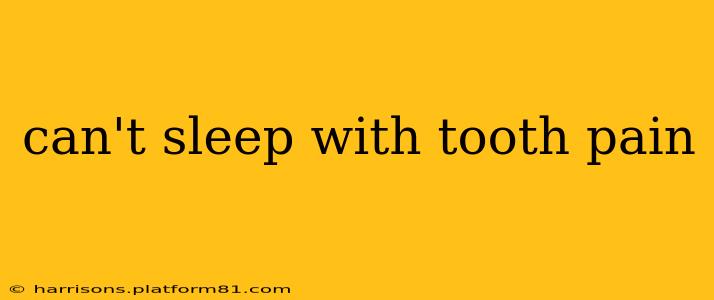Tooth pain is a significant sleep disruptor. That throbbing ache, the sharp stabs of sensitivity – it can make even the most comfortable pillow feel like a torture device. If you're struggling to sleep because of tooth pain, you're not alone. Millions experience this frustrating problem, and thankfully, there are ways to manage the pain and find some relief. This guide explores effective remedies for toothaches that keep you awake, outlines when you should seek professional help, and offers advice on preventing future problems.
What Causes Toothaches That Keep You Awake?
Several factors can contribute to tooth pain severe enough to prevent sleep. Understanding the cause can help guide your treatment strategy. Common culprits include:
- Tooth Decay (Cavities): Bacteria erode tooth enamel, leading to cavities that can become infected and cause intense pain.
- Abscessed Tooth: A bacterial infection at the root of the tooth causes swelling and pressure, resulting in throbbing pain that often worsens at night.
- Gum Disease (Gingivitis or Periodontitis): Inflammation and infection of the gums can cause pain, bleeding, and sensitivity.
- Cracked or Chipped Tooth: A fracture in the tooth, even a small one, can expose sensitive inner layers and cause sharp pain.
- Grinding or Clenching Teeth (Bruxism): This unconscious habit can wear down tooth enamel, leading to sensitivity and pain.
- Sinus Infection: Pressure from a sinus infection can sometimes radiate to the upper teeth, causing pain.
- Impacted Wisdom Teeth: Wisdom teeth that are partially or fully impacted can cause pain, swelling, and infection.
- Dental Work Complications: Pain following dental procedures is common, but persistent or severe pain requires attention.
Home Remedies for Toothache Pain at Night
While home remedies can provide temporary relief, they are not a replacement for professional dental care. Here are some options to try:
- Over-the-Counter Pain Relievers: Ibuprofen (Advil, Motrin) or naproxen (Aleve) can help reduce inflammation and pain. Acetaminophen (Tylenol) can also alleviate pain but doesn't address inflammation. Always follow the recommended dosage.
- Saltwater Rinse: Dissolve ½ to ¾ teaspoon of salt in a glass of warm water. Gently swish the solution around your mouth for 30-60 seconds, then spit it out. This can help reduce inflammation and clean the affected area.
- Cold Compress: Apply a cold compress or ice pack wrapped in a thin cloth to the outside of your cheek near the affected tooth. This can help numb the area and reduce swelling. Apply for 15-20 minutes at a time, taking breaks in between.
- Clove Oil: Clove oil has natural anesthetic properties. Apply a small amount directly to the affected tooth using a cotton swab. Use sparingly, as it can be irritating.
- Hydrogen Peroxide Rinse (Diluted): Mix equal parts hydrogen peroxide and water. Rinse gently for 30 seconds and spit out. This can help kill bacteria and reduce inflammation, but do not swallow.
How Can I Get Rid of a Toothache Fast?
There's no magic bullet for instant toothache relief. However, a combination of over-the-counter pain relievers like ibuprofen and a cold compress can often provide relatively quick, albeit temporary, pain reduction. Addressing the underlying cause is essential for lasting relief. This usually means a visit to your dentist.
What to Do if the Toothache Doesn't Go Away?
If your toothache persists despite home remedies, worsens, or is accompanied by fever, swelling, or difficulty opening your mouth, seek professional dental care immediately. Delaying treatment can lead to more serious complications.
When Should I See a Dentist for Tooth Pain?
You should schedule an appointment with your dentist if:
- Your toothache lasts longer than a few days.
- The pain is severe or unbearable.
- You have swelling or redness in your gums.
- You have a fever.
- You have difficulty opening your mouth.
- You notice pus or drainage near the affected tooth.
Can a Toothache Wake You Up?
Absolutely. The intensity of a toothache, particularly one caused by an infection or abscess, can be significant enough to disrupt sleep, even causing you to wake up in pain.
How Long Does a Toothache Last?
The duration of a toothache varies depending on the underlying cause and treatment. Minor toothaches from sensitivity may resolve quickly, while more serious issues like abscesses require professional intervention and may last for days or weeks if left untreated.
Is Tooth Pain a Medical Emergency?
While most toothaches aren't immediate life-threatening emergencies, severe pain accompanied by high fever, significant swelling, or difficulty breathing should be considered a dental emergency requiring immediate professional attention. You should contact your dentist or an emergency dental service.
Disclaimer: This information is for general knowledge and does not constitute medical advice. Always consult with a qualified dental professional for diagnosis and treatment of any dental condition.
